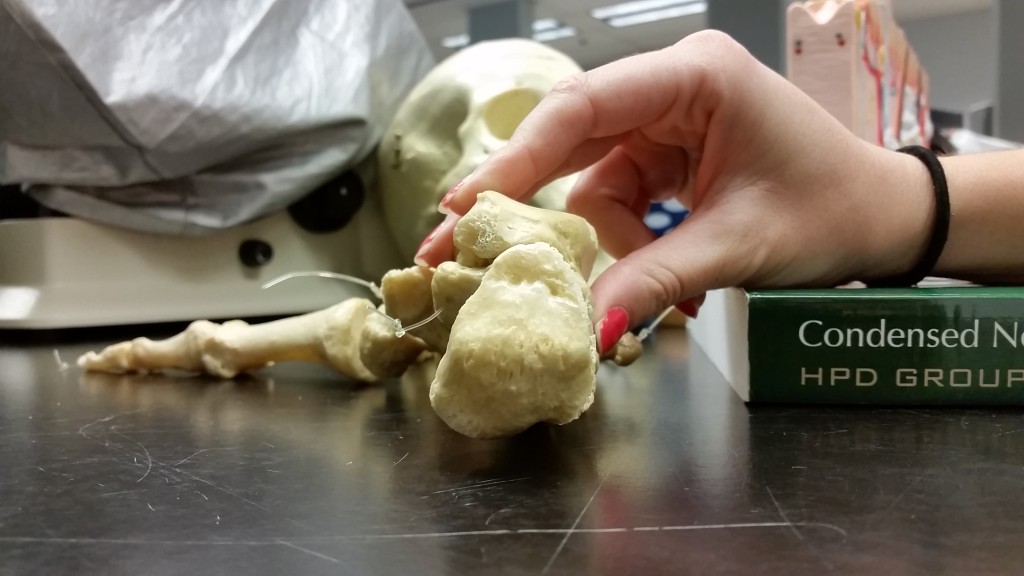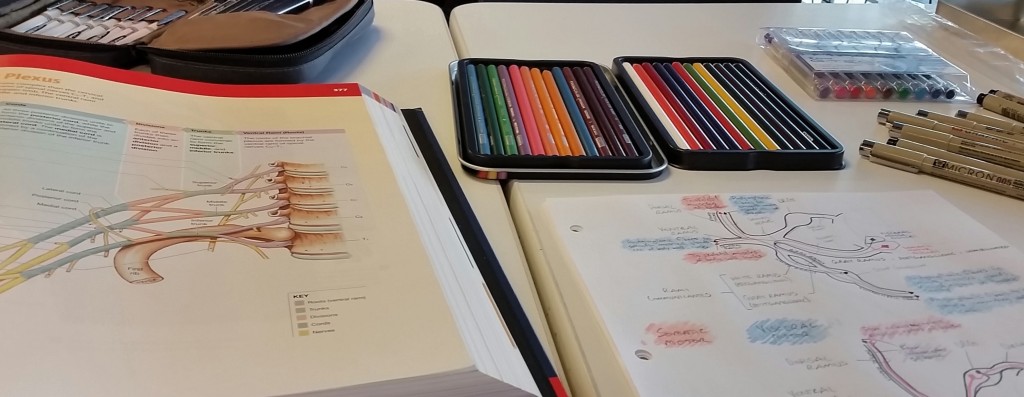To confess, I’ve always been lazy.
Like, super lazy. I know it’s human nature to put in the least amount of effort possible. But seriously, I would never study growing up. Even up until I finished my Kinesiology degree in 2012… let’s just say I was not the best student.
Heck, we were just on fall break and I wanted to study the nervous system. I got out of my routine just a little bit, distracting thoughts enter my head, and then I essentially became useless.
I’ll write those two days off as a needed break, but it’s amazing what a small change in your schedule can do to you.
More specifically for me, it’s a lack of schedule that is most crippling.
I run into people every day who ask how I do the things I do. “You’re just studying that… for fun?” I was walking with a friend yesterday who asked how she can stop procrastinating everything to the last minute.
Let’s talk about it.

How to Overcome Laziness
These are the steps that changed my life the most:
- Schedule
- System
- Support
Schedule – Use procrastination to your advantage
The absolute, without a doubt, hands down, most beneficial thing to do is to set a schedule. And there are three main components to the scheduling process:
- Long-term calendar
- Daily to do list
- Consistent bed/wake times
Long-term calendar
For bigger, further out, or repeating events, I will use Google Calendar to keep track of things. For example, this is how I can visualize how long I will be at work, when I’ll be at class, and when a seminar is.
If you prefer, a wall calendar is a nice alternative. Let me know in the comments below if you use something else.
Daily to do list
If I go to bed without writing down what I’m going to do tomorrow, then I will do nothing tomorrow.
For daily tasks, I use a to do list. I like pen, paper, and Post It notes, but the portability of having a to do list on my phone outweighs the feelings of hipster-osity that I gain from carrying around a notepad. Plus, notepads make my butt sweat.
I try to make my to do lists chronological and I will put the more difficult tasks earlier in the day when my mind is fresher. For example, my to do list yesterday looked like this:
- Anatomy ch 14
- Biology lecture
- Lunch
- Anatomy lab
- Anatomy lecture
- Talk to Eric
- Train
- Dinner
Now, if you take the above list at face value, I don’t believe it will help you. It is more helpful to have smaller steps so you know exactly what pieces you’re chipping away. This is especially important when there are big tasks that you can’t finish in a day.
Studying my anatomy chapter 14 on the spinal cord took about four hours out of my day. It would have been theoretically ideal to sort out the chapter exactly, like “I’m going to draw Figures 14.4, 14.5, and 14.6.”
But I feel as though at some point all that planning gets in the way of doing. So instead, I write down “Anatomy ch 14” with the unwritten understanding that (a) I may not finish the chapter or (b) it may take a large chunk out of my day. Since I know this going in, I don’t overschedule myself. Nothing makes me feel worse than looking at a bunch of unfinished daily tasks as I lay down in bed at night. Sometimes it happens, in which case I will push them to the next appropriate day, but I try to avoid it.
The things in green text are part of my fixed schedule.
My phone call with Eric was impromptu, but I added it to my list after the fact because then I can visualize what I did with my time. It makes me feel better about myself, keeping me motivated to press on. And it is not counterproductive to my goals, nor is it an example of losing focus. I have decided that the time after my anatomy lecture, which ends at 5:45PM, is free time. If I want to keep studying, I can do so, but I am not obligated.

Consistent bed/wake times
The last piece of scheduling is about optimizing your circadian rhythm. We all have internal clocks that, for the most part, keep up with the day-night cycle. When your body gets into a sleep routine, it knows when to wake you up. It is my experience that when your body knows when to wake up, it is much easier to actually get up and moving.
The three facts that drive my sleep schedule:
- I’ve always had trouble getting out of bed in the morning.
- I want flexibility in my schedule at night in case I want to go out to dinner, exercise, or work late.
- I do not need this flexibility in the morning.
Given this, I make sure I wake up at the same time, 6:05AM, every morning. My body knows when I’m going to get up, so it pushes cortisol into my blood to wake me up. Getting up is easy when I stay on this schedule. Given the choice between 6 hours of sleep at my consistent wake time and 8 hours of sleep with a different wake time, I will almost always choose the former.
I prefer to do work in the morning because I feel more productive. If you prefer otherwise, you don’t have to stick to my schedule. Dial it in to fit your needs.
So, to recap our Schedule step, we want:
- Long-term calendar
- Daily to do list
- Consistent bed and/or wake times
These are the three steps that helped me the most. But you can take them even further by using planned breaks and procrastination.
Breaks are good for you
Scheduled study breaks are great for keeping you energized.
People always complain about not having enough time to do everything they want to do.
IMPORTANT POINT: Time is almost never the limiting factor.
When studying, take short breaks every 30-90 minutes. Don’t work through lunch. Sit down and enjoy your food. Recharge. Then get back at it.
The actual limiting factor is energy. Don’t try to work through breaks. Don’t try to work all day every day. Break up your week. Don’t do any work after X:00PM. Forego an hour of sleep to go to the soccer game on Saturday.
You know what, call me crazy, but maybe sleep isn’t important to you right now. If you have been getting good sleep and you meet someone at that soccer game, don’t be afraid to go do something with him/her. Stay up talking until 5AM. Sleep until 6AM. Wake up, get some coffee, and go about your tomorrow.
I know this sounds like poison for your body. No sleep? Is he serious?
Yes. I’m serious. I’m preaching the healthy lifestyle, which encompasses mental health as much as physiological health. Don’t try to sleep one hour every night, but sometimes sacrificing some sleep is worth forming a closer relationship with your friends, family, significant other, or someone you’ll never see again in your life.
You’ll just be able to start the next week with more energy.
Procrastination is good for you
One of the pivotal moments in developing my productivity was realizing that procrastination is not some demon to be burned at the stake.
The secret is to turn it into a weapon.
Having a test tomorrow is a good way to make yourself go through a bunch of material, but as you know, you won’t retain a whole lot.
Being busier actually makes it easier to stay motivated. For example, if I have a test on Monday, I better make sure I’m done with my first pass through the material on Friday because I’m busy all Saturday and need to review on Sunday.
Reframe your study process.
| Previous study steps | Current study steps |
|
|
How do you know when you’re done? I always ask myself, “Am I comfortable teaching this to someone?” If not, I’m not ready yet. I need another pass through the material.
Impose restrictions on yourself. Make it your goal to finish early so you can take it easy this weekend.
Hold yourself to a higher standard. You will survive.
System – How do you study?
If you follow me on Instagram, you’ve no doubt seen my many pictures of coffee and studying.
How do you study?
If you’ve never thought of an answer to this question before, then it’s time to think about it. And even if you have an answer, I (probably) don’t think it’s specific enough.
When I want to study, I go all in.
My study process includes:
- Noise-cancelling earbud headphones (I would get the bigger ones because they sound better, but they make me sweat something fierce)
- Listen to music without words I understand (main examples: Sigur Ros, Explosions in the Sky, and Animals as Leaders)
- Sit in a chair that simultaneously allows my heels to rest comfortably on the floor and my back in the back rest (I’ll fidget while studying, but these are prerequisites)
- Use a desk that I don’t deem “too high”
- A desk with lots of room (I can work with front-to-back OR side-to-side room… how’s THAT for Antifragile?)
- Sit facing out into the open so that I can people watch on my breaks
- Breaks every 30-90 minutes (depending on whether or not I’m “on a roll”)
- Caffeine
- Soapbox moment: drip coffee sucks. Find a place that will make you a pour over, Aeropress, or has cold brew available and block out the extra time into your schedule to be pretentious about your coffee.
- Blank paper (so that lined paper doesn’t bias me into rigid thinking)
- Whatever writing utensils I need. For example, in the above picture you will find…
- 0.8mm Uniball Vision Elite colored pens (bold point for main concepts)
- 0.5mm Uniball Vision Elite colored pens (all-purpose point for faster writing)
- 0.4mm Pilot G-TEC-C4 colored pens (fine point for details)
- Sakura Pigma drawing pens (works better for drawing than real pens because they don’t mix with the other utensils as much)
- Prismacolor Premier 24-pack colored pencils (I don’t think 12 is enough)
- 1-inch Wilson Jones Ultra Duty D-Ring binder (keeps track of all of my papers; super durable; D-ring lets pages lay flat; cover flips all the way around; easy one-handed ring trigger thingy)
I tell you all of this to illustrate a point. I am only anal-retentive about these things because they work for me. Can I study without the perfect scenario? Sure! But I will avoid it whenever possible.
You don’t need to do what I do, I am simply offering a suggestion. If you do things differently, I’m curious to hear about your strategies in the comments below.

Support – Who is keeping you accountable?
How can you turn studying into a part of your weekly routine? Find someone who will force you to do so.
In part, you can play this role for yourself. Yesterday I drew out cross-sectional anatomy of the spinal cord because (a) it was fun, (b) it will be on my anatomy test, and (c) it made me smarter. I decided it was a worthwhile investment of my time.
The problem here is that it’s so easy to let yourself down, much easier than letting someone else down (assuming you’re not a terrible person). So you make excuses and don’t accomplish your goals of studying. The idea that “I want to become smarter” is so intangible that it’s almost fake.
How can we make it feel real? Well, we talked about your daily to do list. Do that. Step by step, mark off the things you do. Your goal is already becoming more tangible.
Picture yourself making new connections in your brain to store these memories. Lay down new AMPA receptors. Move that magnesium to open up NMDA receptors. I know this is cheesy, but sometimes visualization like this can help.

The best way to stay accountable is to find someone else to do the job. I see three main ways of accomplishing this:
- Study regularly with someone else, even if you’re studying different subjects
- Give someone a check and tell them to send it to the Nazis if you don’t update them on your progress every day/week
- Get a tutor
The most motivated people can get by with their intrinsic drive to get better. Since you’re a normal human being from this earth, I assume that’s not you.
A study buddy is nice because it’s as if you’re a superhero team working together to fight off early-onset dementia, even if you’re studying different subjects.
The check method is good, but only if you can keep the check in the front of your mind. If you forget about it, this method is no longer effective. And you need to have a stone cold friend for this to work. No enablers, please.
Getting a tutor offers the most benefit:
- You pay for it, using money as a motivator.
- You’re studying with someone, offering you that superhero camaraderie we were just discussing.
- You can practice teaching the concepts to someone else.
- You have someone who can help you work through the material and solve problems.
- You have someone who can observe your study habits and thinking patterns, then offer suggestions for improvement.
How to Stay Motivated to Study
To recap, these are the steps that changed my life the most:
- Schedule
- System
- Support
Just a few weeks ago, I spent an entire hour going through this whole process with a kid I’m tutoring.
ACTION STEP: Your homework is to block out an hour sometime in the next coming days: sit down, hash everything out, and come up with your plan.
Once you have a plan, all you have to do is execute. And that’s when the fun starts.
Photo credits: Lance Goyke, Allen Tucker, Ruth Drdla and Jürgen Sandkühler [CC BY 2.0]


Add some color to this commentary.